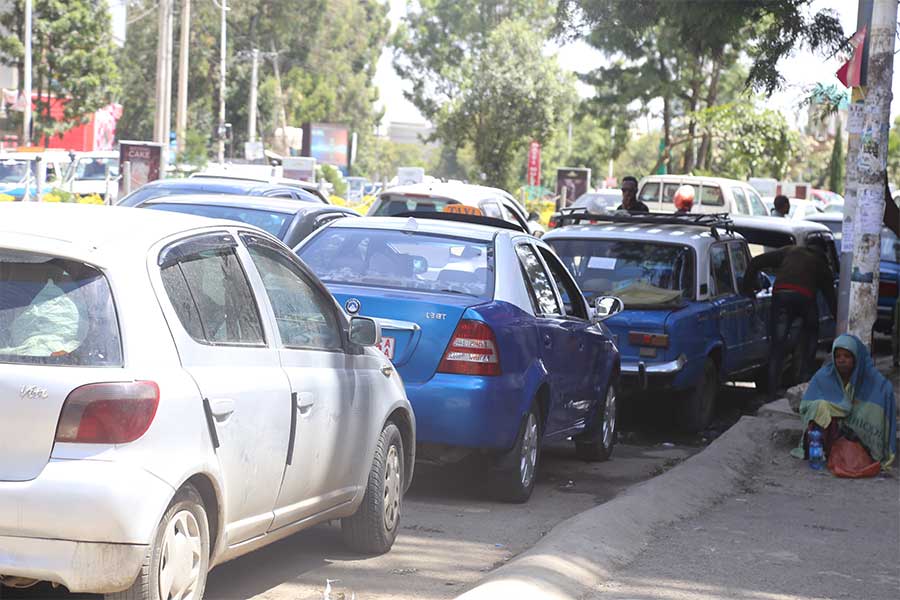
Fortune News | Sep 21,2019
The awaited standard to regulate freight transport services is put forth by the Ministry of Transport & Logistics delineating the duties of operators, requirements for licensing, and structural organizations.
Signed off by Alemu Sime (PhD), the directive puts transport associations as commercial entities indicating their physical and administrative framework. Commercializing the transport sector is one of the 10-year reform strategies ushered by the Ministry this year, rendering the categorization of freight operators under share and private limited companies and private businesses.
Officials hope to improve the sector's efficiency by expanding competitiveness and opening up domestic and foreign investment.
According to State Minister Denge Boru, the country has lagged behind in the sector, ranking 111th in the logistics performance index in 2022. He said that although transport service had existed for several decades it has borne little fruit to enhance the sector.
Ethiopia uses Djibouti ports as its main gateway for international trade approximating up to 95pc with most of its goods transported by truck. Rapid economic growth for over a decade coupled with the African Continental Free Trade Area and the growth of Ethiopian cities necessitated the enhancement of freight and public transport.
Transitioning to a commercial transport entity demands assets of the associations be audited and approved by members of the general assembly and transferred to the newly established company.
One of the recently transitioned share companies, Freedom Transport & Logistics S.C., has been incorporated as a share company, floating shares to its members and the public. It has garnered nearly 70 shareholders with a four million Birr paid-up capital.
The level-3 transport company formerly known as Idyor Cross Border Freight Owners Association, has already bought and registered one freight vehicle.
"We are hoping to reach the seven-vehicle ceiling in three years," said Yoseph Alemu, the general manager.
Yoseph who had served as the operational manager at the Association claimed that the transition to a commercial entity did not go as intended with the reinstatement of seven new board members.
"The association fell apart in the process of transitioning," he said.
Many believe despite the benefits of reestablishing transport associations as commercial entities, the execution has been rushed.
President of the Ethiopian Transport Employers’ Federation, Birhane Zeru said comprehensive transition guidelines had lacked for most of the associations with the directive taking too long to stipulate.
"The associations needed at least two years to transition to commercial entities properly," he told Fortune.
Birhane who has headed 98 members said that close to 10 associations have already transitioned to commercial entities while the remaining are on their way. He acknowledged that the Ministry has been involved in the making of the directive following a change of leadership that appointed Alemu Sime as the Minister.
"There was a great resistance for input before that," he said.
The implementation of the directive encountered huge criticism and exhortation within the months of ratifying the proclamation in 2022. Birhanu observes that most comments had been reposed in the directive.
One of the enquiries was easing down the number of vehicles required for incorporation. The directive stipulates that the required number of minimum vehicles decreases with rising levels reaching 25 in the next three years for level one operators organized under share companies.
"Our asks have been answered," he said.
Freight operators are required to inform the number of vehicles they purchase, and the distances covered by the vehicles every month while associations are obliged to obtain a business license before an operating license is provided by the Ministry for a year.
The informal payments freight operators are subjected to while crossing regional and intraregional corridors were not addressed in the directive. Denge disclosed that there are illegal transactions in every transit corridor that have been subjecting drivers to unnecessary payments where re-fund has been prohibited without a receipt.
He said prolonged discussions with authorities of several regional states and the government of Djibouti are being held to legalise the informal payments.
"This is going to take time," he said.
Experts affirm that commercializing transport associations is a necessary precondition for competitiveness with income level growth, an increase of resources, automation of procedures and communication technology.
Abinet Solomon, a commercial lawyer with several years of experience applauded the move and recalled recreating transport associations as commercial entities were attempted two years ago. He observes that the sector has moved forward with low utilization rates for the past several decades.
According to Abinet, appropriately designed regulations are important in promoting competition, setting quality standards, and supporting professional organizations that will develop logistics competency.
PUBLISHED ON
Jul 01,2023 [ VOL
24 , NO
1209]

Fortune News | Sep 21,2019

Radar | Aug 27,2022

Commentaries | Dec 04,2020

Radar | Mar 27,2021

Radar | Jul 06,2025

Fortune News | Feb 15,2020

Fortune News | Nov 13,2021

Fortune News | Sep 14,2019

Fortune News | Jun 04,2022

Fortune News | Aug 26,2023

Dec 22 , 2024 . By TIZITA SHEWAFERAW
Charged with transforming colossal state-owned enterprises into modern and competitiv...

Aug 18 , 2024 . By AKSAH ITALO
Although predictable Yonas Zerihun's job in the ride-hailing service is not immune to...

Jul 28 , 2024 . By TIZITA SHEWAFERAW
Unhabitual, perhaps too many, Samuel Gebreyohannes, 38, used to occasionally enjoy a couple of beers at breakfast. However, he recently swit...

Jul 13 , 2024 . By AKSAH ITALO
Investors who rely on tractors, trucks, and field vehicles for commuting, transporting commodities, and f...

Oct 11 , 2025
Ladislas Farago, a roving Associated Press (AP) correspondent, arrived in Ethiopia in...

Oct 4 , 2025
Eyob Tekalegn (PhD) had been in the Governor's chair for only weeks when, on Septembe...

Sep 27 , 2025
Four years into an experiment with “shock therapy” in education, the national moo...

Sep 20 , 2025
Getachew Reda's return to the national stage was always going to stir attention. Once...